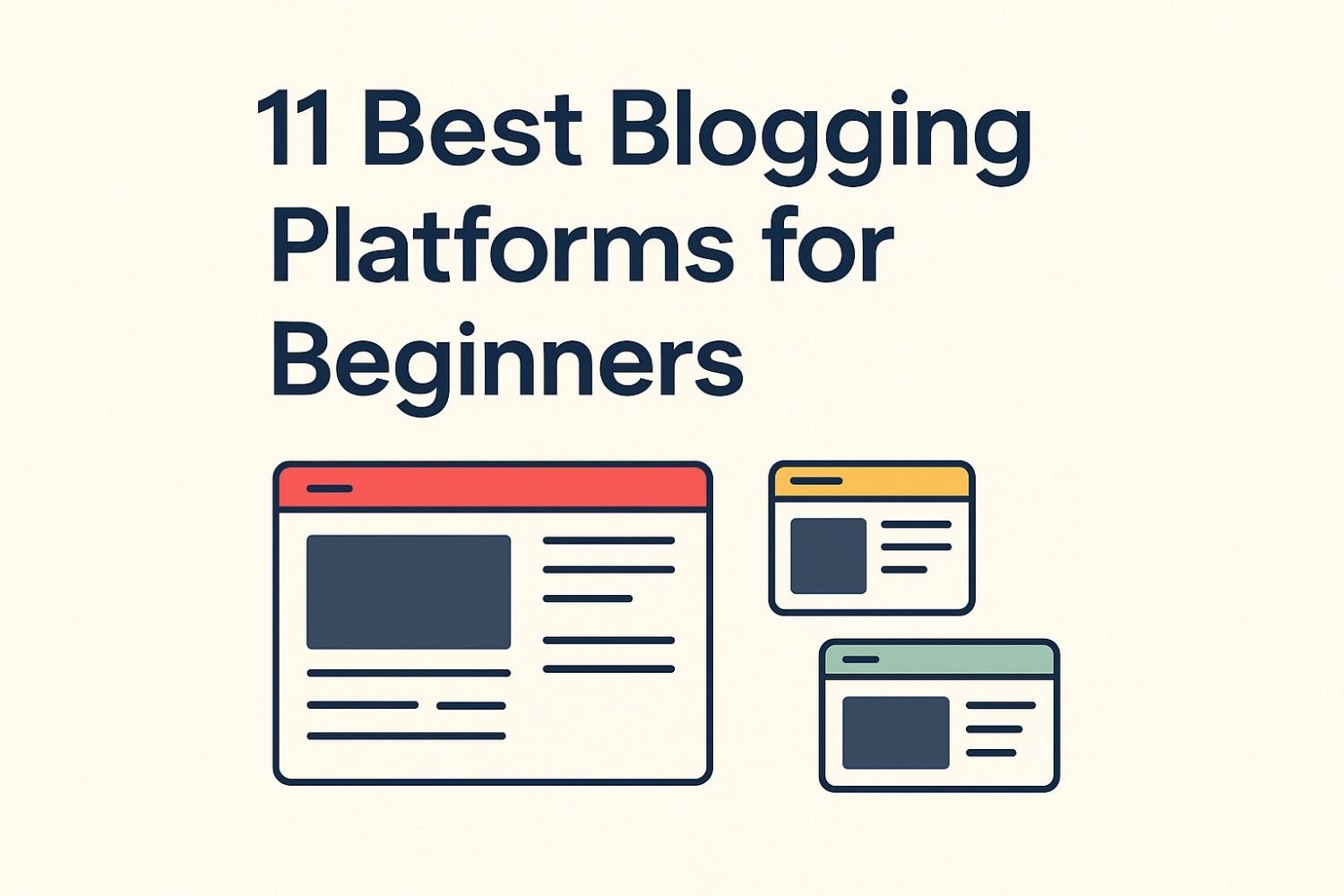The best blogging platforms lay the foundation of online success but choosing the wrong platform affects your business, so how will you know which one fits for you?
Popular blogging websites are powered by the best blogging platforms that provide essential features to scale and improve the performance of your website at a minimal price.
Key Takeaways:
- Blogging is scalable when you choose the right platform
- Best blogging platforms offer security, scalability, and premium customer support
- WordPress is the most popular blogging platform and runs 43.4% of the entire world’s websites
- Most of the platforms offer a free plan that is enough to help you get established online quickly
- Use Wix and Squarespace if you prefer a minimal simple design for your website
- If you prefer an instant built-in platform audience then choose Medium and LinkedIn for more business opportunities
- Use Blogger for quick blogging if you are a non-techy person looking to grow online, it’s easy to use and supports monetization
My Featured Answer For Blogging Websites:
The best blogging platforms include WordPress, Wix, Blogger, Hubspot CMS Hub, Joomla, Squarespace, LinkedIn, Medium and they are extremely effective. Each platform is designed to meet the needs of bloggers with different skillsets, and the ideal platform depends on its ease of use, technical ability, scalability and goals.
Table of Contents
11 Best Blogging Platforms
Choosing the right platform is crucial for your blogging journey as it defines and influences the success of your online business.
The free blog sites can help you get started providing you the space, flexibility and time to grow, while the best blogging platforms for beginners are often paid which offer you control, extra customizations, and scalability options.
The 11 platforms below are some of the best easy-to-use blogging platforms. Choose 1 that aligns with your goals.
1. WordPress (Most Popular CMS Platform)
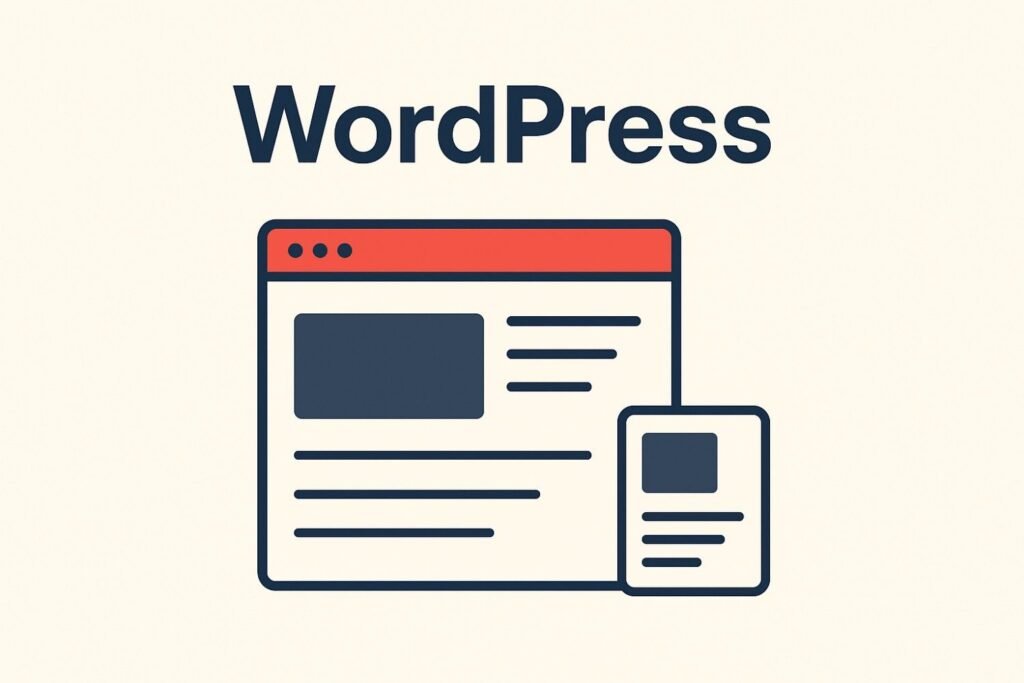
WordPress is the most popular CMS blogging platform on Earth right now powering 43.4% of the entire world’s websites and offers unlimited customization potential for a fair price.
WordPress is one of the best website platforms you’ll ever use. I have been using WordPress.org for many years now, and I started with Blogger first.
WordPress comes with 2 variants: WordPress.com and WordPress.org so let’s understand both of them in detail.
WordPress.com
WordPress.com is one of the most popular hosting options you can consider if you prefer premium options at a fair price.
WordPress.com offers one of the world’s best-managed WordPress hosting plans and control over your website.
Here are some amazing features of WordPress:
- It supports large library of themes and designs for your website
- They add extra amazing functionalities on your website, however for free plan they are somewhat limited
- The designs are very responsive on multiple electronic devices including laptops, mobiles, tablets
- Offers a powered built-in tools that can help you in content creation
- You get managed software updates and security with WordPress.com
- It offers multiple types of hosting that can keep your website live and friendly
- It’s built with SEO-friendly code to optimize for SEO
Pros
- WordPress.com is an extremely beginner-friendly platform and easy to use
- It’s scalable, reliable, and performance-efficient
- Offers a free plan to try and test it out
- Includes web hosting and eliminates the need to buy them separately saving you good amount of money
- Provides world-class security to make sure your website is safe and offers superb uptime
Cons
- Offers limited control when compared to WordPress.org
- Offers ads on the free plan, hence only upgrading can save you from ads
- A bit costly for beginners and small bloggers
WordPress.org (Self-Hosted)
This is the most popular platform available for free with the best web hosting platforms and offers exclusive customization options, 1000s of free available themes and useful plugins that you can use to customize your website and scale your online business.
The features of WordPress.org are:
- Fantastic active community support
- You can use your own domain for full customization
- It offers you control and run your successful online store by building an E-Commerce website
- Allows advanced SEO optimization for your website
- Suitable for web-developers and even non-tech people
- Provides multiple themes and plugins with amazing customization options
Pros
- WordPress.org offers fantastic community support and full control for your website
- It is an open source platform, available for free with hosting and scalable
- It offers unlimited customization for your plugins and themes, and supports a premium ability to even modify the code of your website
- You can monetize your platform via multiple streams and get money consistently
- WordPress.org can integrate with multiple tools and platforms like Google Analytics, email marketing services, and even payment gateways
- The scalability is limitless, you can start a small blog from 0 and build it to a large E-Commerce website with countless visitors and sales
Cons
- Its self-hosting means you need to buy domain and hosting seperately
- There is no dedicated support team but offers fantastic live communities online which is active
- WordPress.org demands basic technical capabilities to manage your site performance, upgrades, and security handling
Once you have installed WordPress after buying hosting, learn how to start a blog.
Do you know that you can get amazing customization options with WordPress but a website developer can help you do that in no time? For beginners, it can be a nightmare to design a blog website or any type of website.
BK Themes Design can help you with SEO and website development, allowing you to grow faster, giving you an edge over your competitors.
WordPress is extremely flexible and as it offers extensive plugins and functionalities most bloggers focus on email marketing.
But what if you can hire an expert who can focus solely on email audit, ongoing support, and helping you configure your emails for supreme optimal delivery.
Campaign Cleaner can help you do everything, from scratch, and get expert email deliverability consultants.
2. Wix
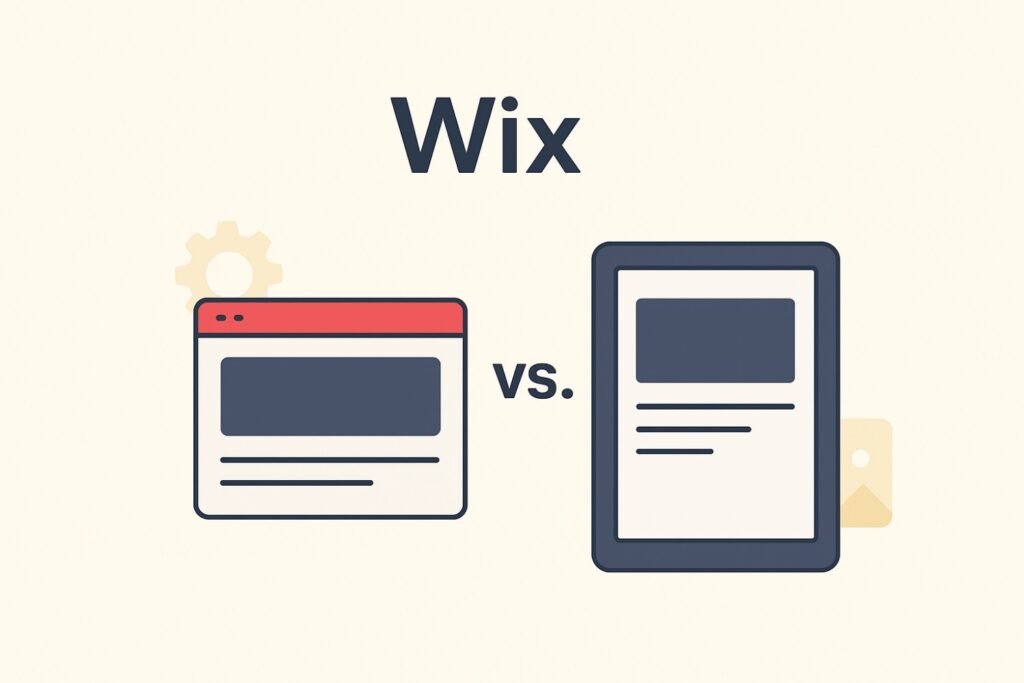
Wix is one of the most beginner-friendly platforms for blogging and uses a simple drag and drop editor and eliminates and need for coding, where you can create free blog sites.
You can create, design, and optimize some of the best blog websites and improve customer retention, attracting users, and better engagement.
For first-time bloggers, you can use Wix to create blogs in hours instead of weeks.
Pros
- Offers security and hosting
- IT does not require coding to work and offers fantastic theme customization
- Offers build-in SEO, analytical tools, social sharing options
- You can create multiple websites, pages and posts with the free plan too
- It’s beginner-friendly and uses a drag-and-drop builder for efficient use
Cons
- Wix offers limited functionality compared to WordPress.org
- You need to upgrade to a paid plan to access premium features
- Migration to new platform with existing content is tricky
- You cannot get a free custom domain with the free plan
3. HubSpot CMS Hub
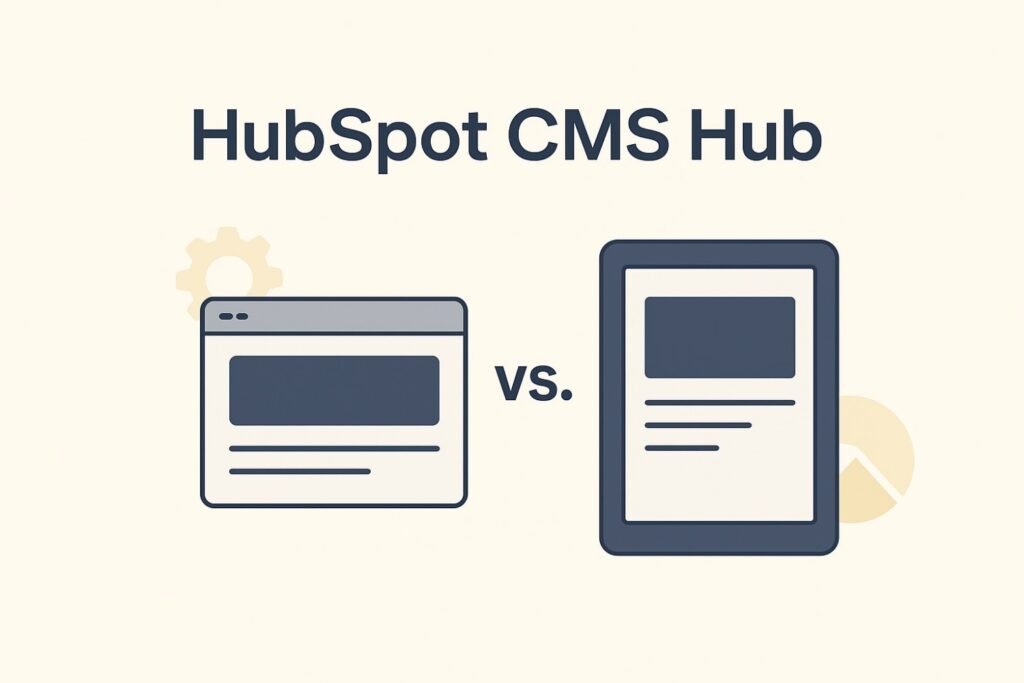
If you are someone looking for blogging and marketing in one platform, then go with HubSpot CMS Hub.
It integrates seamlessly with marketing tools and HubSpot CRM, and its beginner-friendly design is especially for small bloggers to get started with essential features.
Pros
- Offers drag and drop editing and personalization
- It can integrate with HubSpot CMS which is a world-class software and integrates with marketing tools
- It’s built-in for SEO, lead captures and provides analytics to measure metrics and your performance
- Offers smart content personalization and A/B testing
Cons
- Even though beginners can try these platforms, it’s still suited for business bloggers and not hobby bloggers
- It is expensive comparing to other beginner tools
4. Joomla
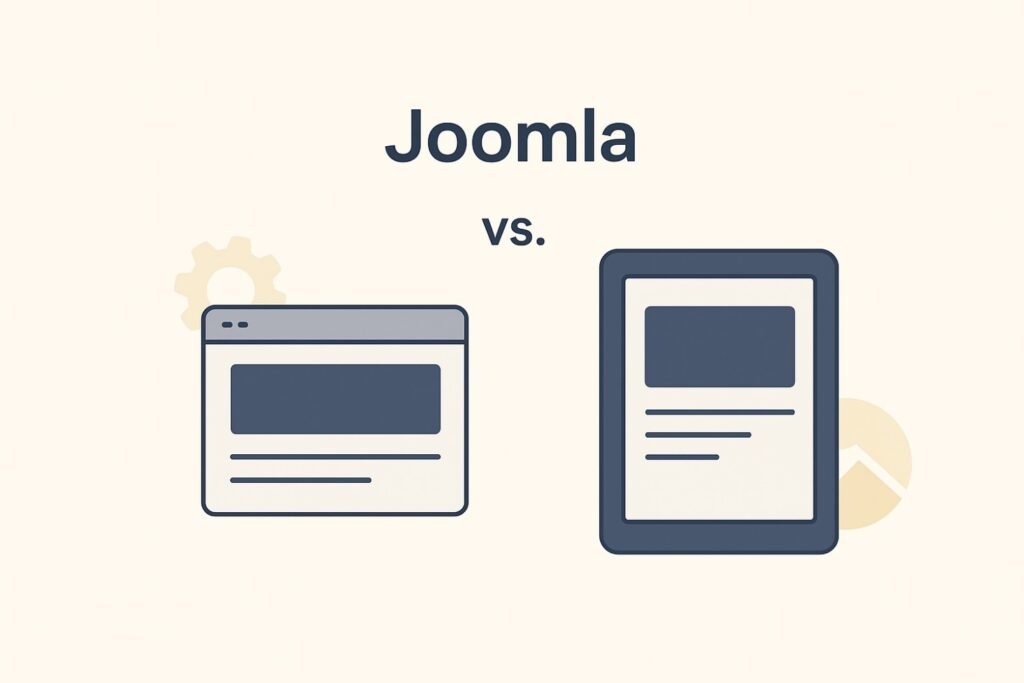
Joomla is one of the most popular CMS platforms to share your writing online and it’s also an open source, flexible tool power-packed with features and various customization options.
Pros
- Fantastic for creating complex websites and applications
- Joomla is powerful and flexible
- Strong multilingual support is available for users
- It is highly customizable with extensions
Cons
- It has a smaller community compared to WordPress
- It is not so beginner-friendly and focused on advanced developers who want to develop a database-driven website
- It provides fewer templates and tools compared to WordPress
- Steeper learning curve compared to famous platforms like Wix and WordPress
5. Medium
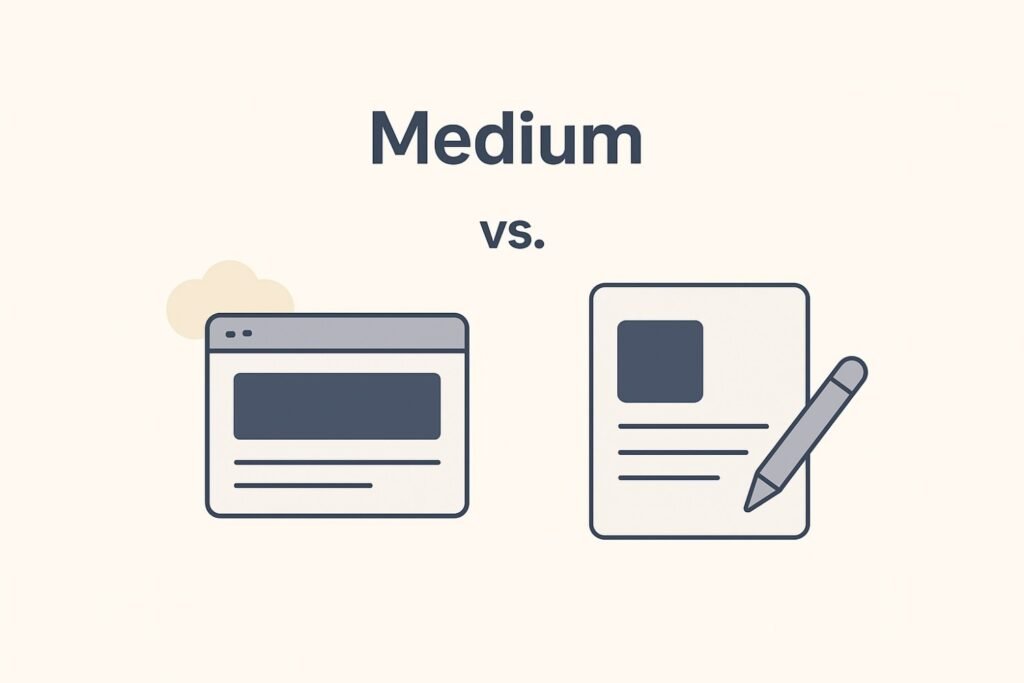
One of the most active platforms offering multi-million visitors every single month, with a strong user base and community, Medium is one of the best platforms to write blogs, share your content online, write from your heart, and become popular.
Medium is a writing-first platform offering you the space to thrive, and write but the focus is limited for designing.
Pros
- Extremely beginner-friendly and easy to use
- Great for storytelling
- Medium drives large volumes of traffic to your website
- Offers a built-in reader community and distribution
- Offers paywall monetization
Cons
- Offers limited branding
- Designing is very limited compared to platforms like Wix and WordPress
- Monetization is dependent on Medium’s partner program
6. LinkedIn
LinkedIn is one of the most popular platforms on the planet today and it’s famous for Personal branding, growing your business, collaborations, sharing posts, writing articles and driving leads.
If you want to grow your online business right from your Day 1, you simply cannot ignore LinkedIn and its features.
Pros
- Offers huge built-in audience for professionals
- You can connect with individuals and brands
- Post and write articles
- Premium account enables you to dominate freelancing services compared to free accounts
- LinkedIn is great for personal marketing and B2B
- Easy integration with your network, you can connect and work with your ideal clients
Cons
- They can ban your profile if you have duplicate accounts
- There are limited customization options available for you
- Content reach is dependent on the LinkedIn algorithm
7. Weebly
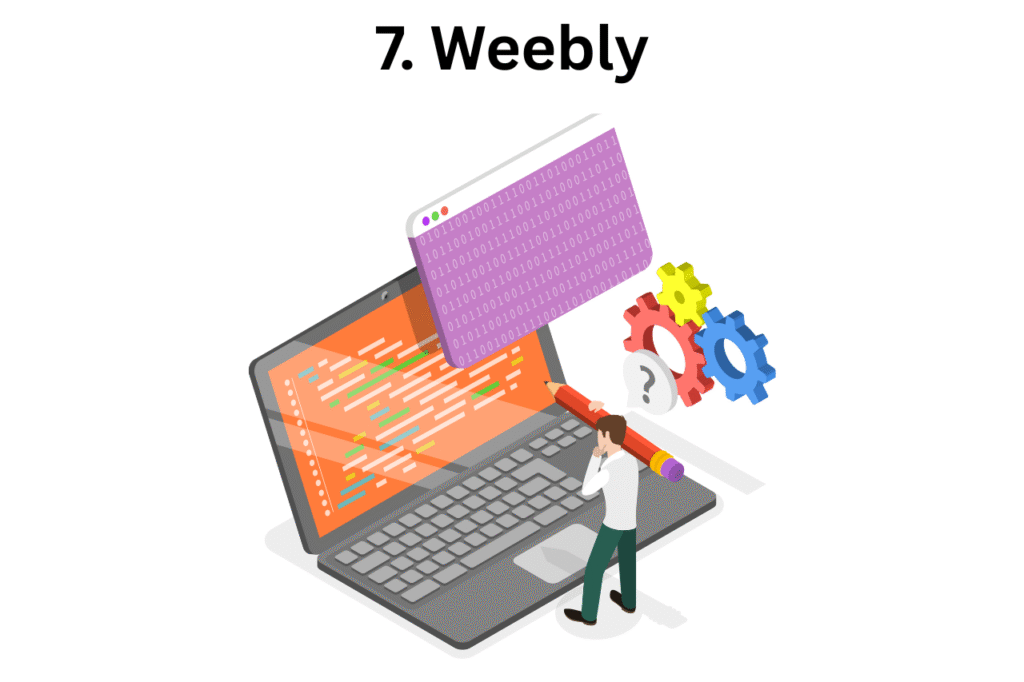
One of the easiest drag and drop editor beginner-friendly platforms that exists today, Weebly is owned by Square and offers extra E-commerce functionalities.
It is great for e-commerce sites and hobby bloggers who are willing to build the best blog websites.
Pros
- It supports beginners and freelancers looking to create a successful navigational website
- Offers great mobile customization
- Beginner-friendly interface
- Free plans are available and offer affordable pricing for paid plans
- Supports integrated e-commerce features to run your successful online store
Cons
- There are less customization options
- Less advanced features available for blogging
8. Squarespace
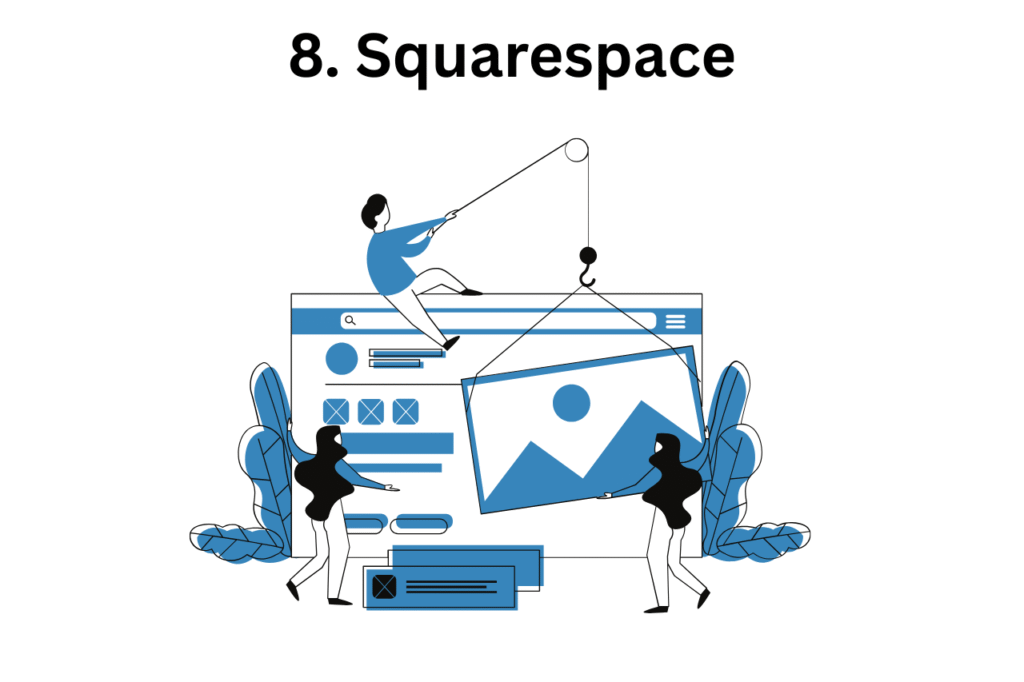
Small businesses and creative writers will find Squarespace intimidating and it offers beautiful templates to design your website and attract customers from different regions.
Pros
- Supports beautiful, modern templates
- Strong E-Commerce portfolios and tools
- Great with security, updates, and all in one hosting
Cons
- Slightly more expensive for most beginners
- Offers limited customization than CMS like WordPress
9. Tumblr
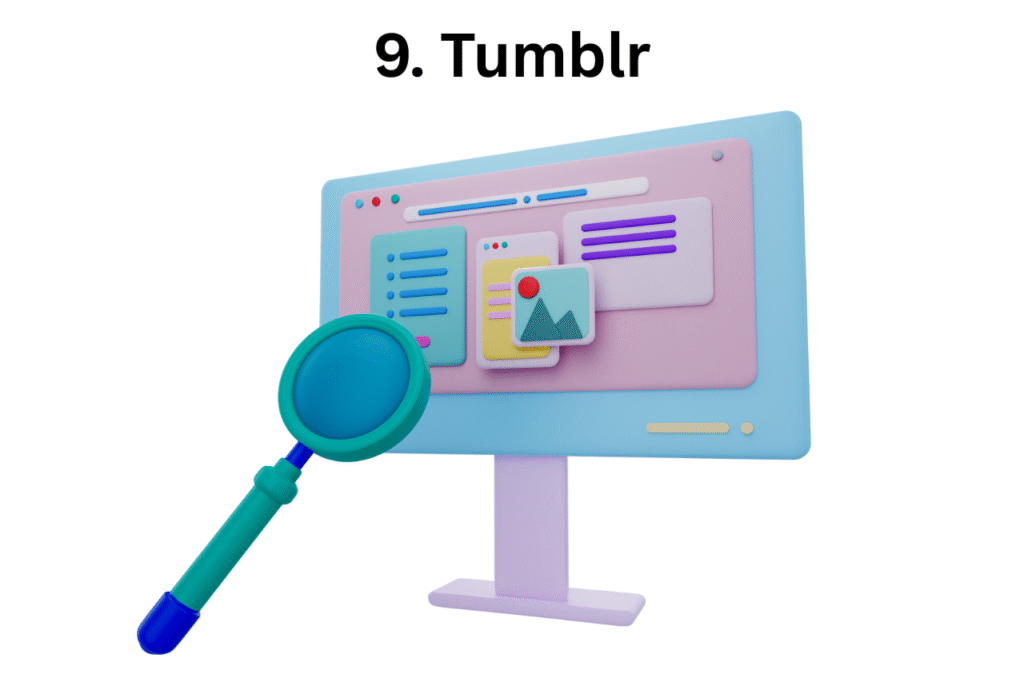
Tumblr is a micro-blogging platform, good for sharing content online and optimizing for basic SEO.
Tumblr is great for blogging as it blends social networking with blogging to share content and stunning visuals.
Pros
- Tumblr is free and easy to use
- Offers sharing features and a strong community
- Fantastic for visual, blogging and creative writing
- Supports decent SEO practices
Cons
- You have less control over monetization
- Limited SEO and professional features
- Wix offers better options and is a more popular tool available in the market
- You cannot self-host so if Tumble vanishes your site will also vanish away
10. Ghost
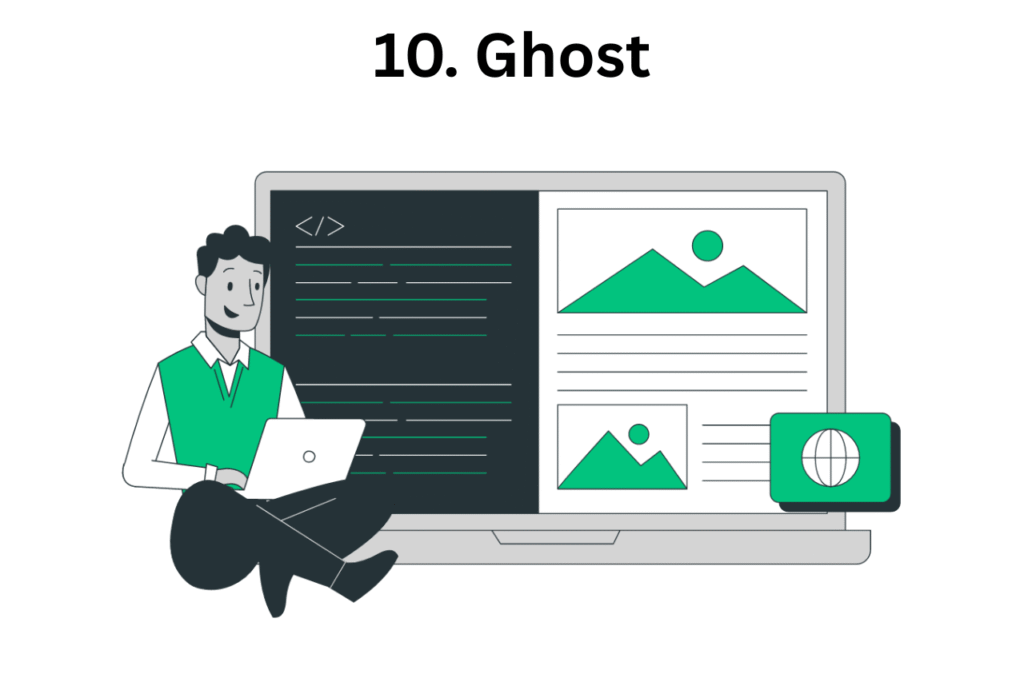
Ghost is one of the best newsletter and blogging platforms, it is open-source and beginner-friendly.
It is designed for professional publishers and individual creators looking to make an impact online with their words.
Pros
- SEO friendly and help you get visible on search engines
- You can better write and focus on content, plus the newsletters
- It offers a minimalist editor and is clean and fast, reliable too
Cons
- It requires buying a hosting for self hosted service
- Requires technical knowledge to set up and manage efficiently
11. Blogger
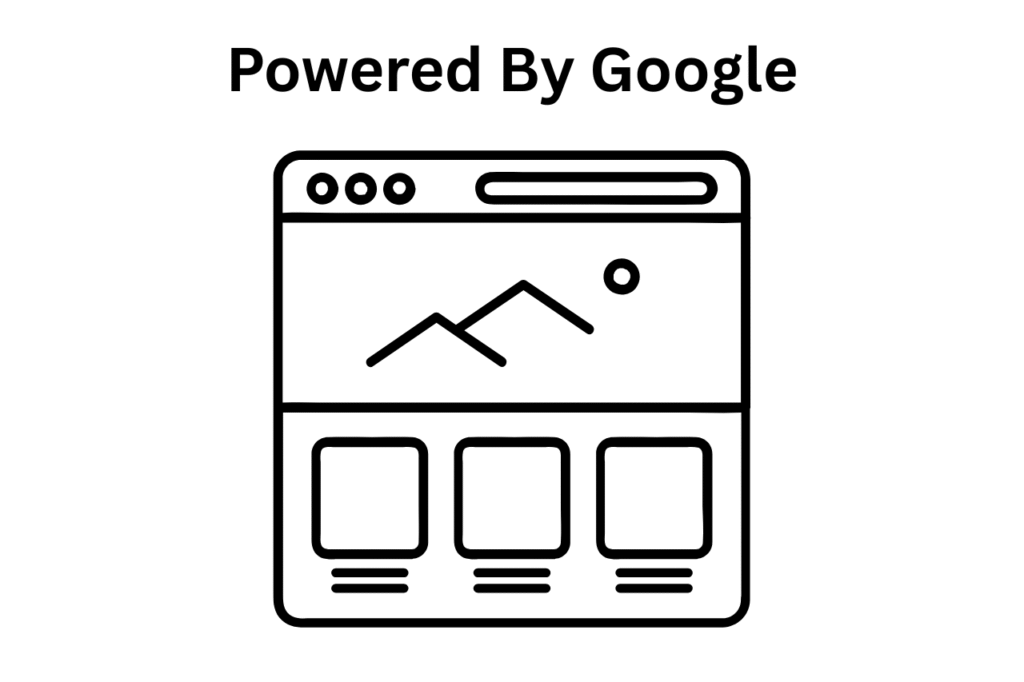
Blogger is powered by Google and is one of the most popular platform for blogging for free and is highly beginner-friendly.
I started my journey with Blogger and till now, I believe it is one of the best platforms that let you write blogs and even monetize your content and earn money, share it and get views consistently.
Pros
- One of the most easy to use, oldest, and trusted platforms for blogging available today
- It is free and no-technical setup is required
- Supports SEO
- Easy integration with other Google services
- Supports monetization opportunities
Cons
- Provides outdates templates
- Limited customization options
- Suitable for hobby bloggers, not for professionals
FAQ on Best Blogging Platforms For Beginners
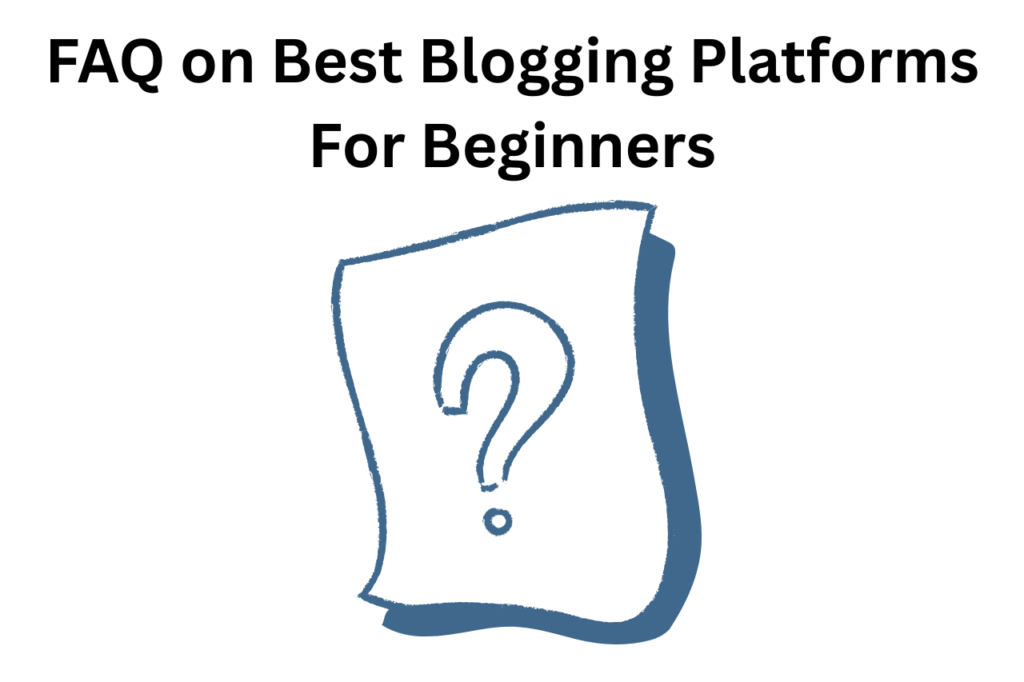
Which Platform Is Best For Blogging?
WordPress is the best platform for blogging today followed by Wix and blogger. They support monetization and the ability to customize your website.
Which Platform Is Best For Getting Started?
Blogger is one of the best and easiest to get started. Wix and WordPress provide more options, while LinkedIn drives business opportunities so each platform is crafted for different roles.
Which Is The Best Blogging Platform For Personal Blogging?
WordPress is the best blogging platform for personal blogging followed by Blogger, Wix and Medium.
What Is The Difference Between WordPress.org And WordPress.com?
WordPress.org is the most popular open-source self-hosted CMS platform that requires buying hosting and a domain from a provider, while WordPress.com provides one of the best managed WordPress hosting, which is slightly expensive for beginners.
Can I Monetize My Blog On Free Platforms?
Yes, you can absolutely monetize your blog on free platforms and earn money from it but options are limited and vary based on the platform you use.
Which Platform Is Best For SEO?
WordPress is insanely optimized for SEO, while Wix and LinkedIn both support strong SEO growth. SquareSpace, Joomla, and Medium follow the same path.
Which Platform Is Best For Business Blogging?
WordPress and HubSpot CMS Hub are best for business blogging as both offer marketing tools and integrations to track your performance and improve your online business.
Can I Switch Blogging Platforms Later?
Yes you can switch platforms later but some platforms offer seamless transitions over the other, like from Blogger to WordPress, it’s easy to migrate.
Which Blogging Platform Is Best For Writers?
WordPress, Wix, Medium, and LinkedIn support the best facilities for writers.
Are There Blogging Platforms That Include Built-In Analytics For Beginners?
HubSpot CRM hub offers built-in analytics for beginners.
Which Platform Offers The Fastest Loading Speed For Beginner Blogs?
WordPress offers the fastest loading speed for beginner bloggers along with LinkedIn, Blogger and Medium.
Conclusion On Best Blogging Platforms For Beginners
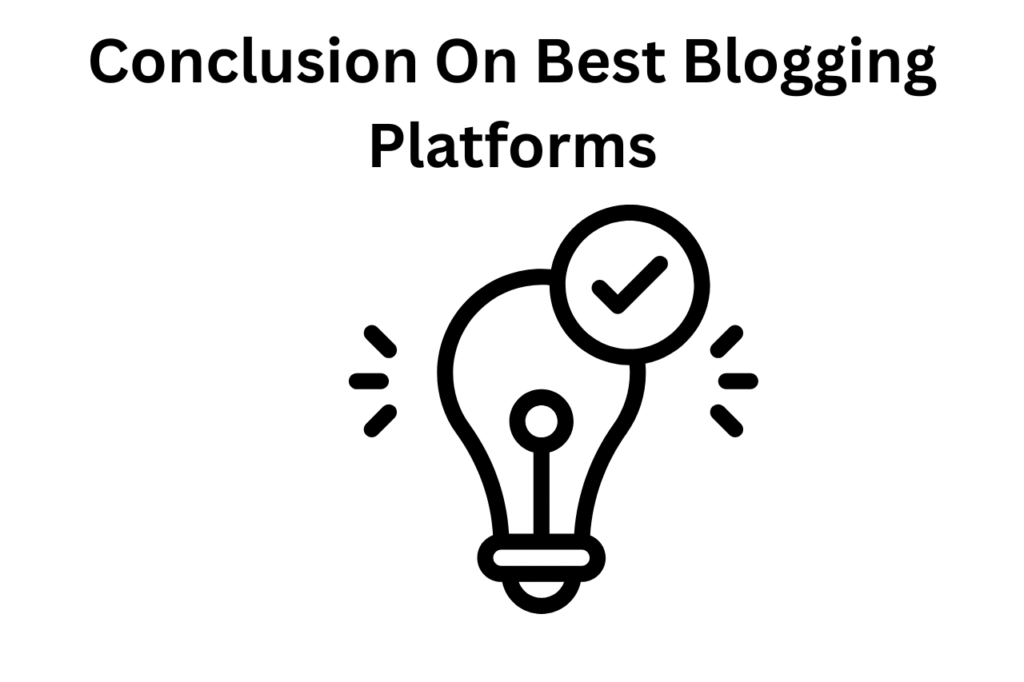
You can create some amazing blogging websites for your projects by looking at the 11 best blogging platforms for beginners and each one of them comes with their unique pros and cons.
My favorite is WordPress as it controls most of the market today and offers exclusive customization options while other platforms do give a lot for free.
It is up to you to decide which blogging platform suits your requirements and select one that fits your goals.
What’s Next For You?
- Sign up with a popular CMS platform of your choice
- First create a free account if available and test the platform for a week and see is it woking well for you, are you comfortable using the platform?
- Choose a popular Platform and build one of the best blog websites that will exist online for many log years
- Make sure you monetize your content and enjoy the blogging journey

With 7 years of blogging experience and I have worked on multiple niche and now I want to make sure I share what I learned over the years and master Digital Marketing and Blogging for the Future in this AI World.
I hold a masters degree in Climate sciences and policy and bachelors in Environmental Sciences and I’ll make sure you will get authentic, original, fresh, data-backed content.
I’ve dedicated myself to blogging with authenticity, honesty, transparency, depth, and purpose — not chasing trends, biasness or opinions, but sharing truth-based insights, timeless knowledge, and fact-rooted research that can empower lives across generations.
TimelessAim.com is not just a blog or a business.
It is the soul’s mission — to serve the world through truth, wisdom, honesty, right knowledge and educate people about the online world through latest digital marketing information.
Every single blog, article, tool, and project is built to share authentic, unfiltered real knowledge. Restore trust in information for all.
Building a legacy, an empire that starts with selfless truth and ends in global upliftment, helpful for everyone.
When information becomes sacred, the world totally transforms – Its True.
That’s the aim — and that’s the promise of TimelessAim 🙂

